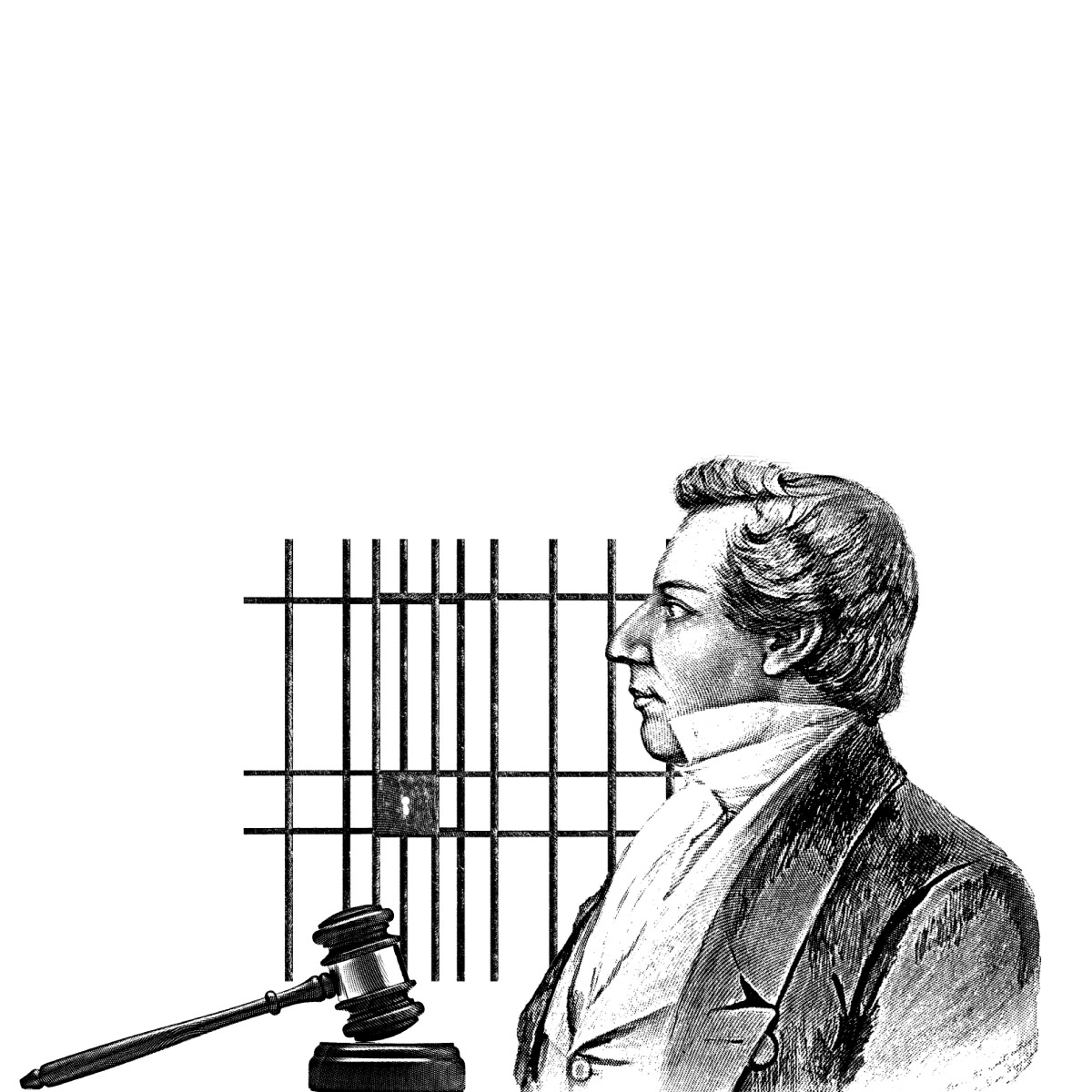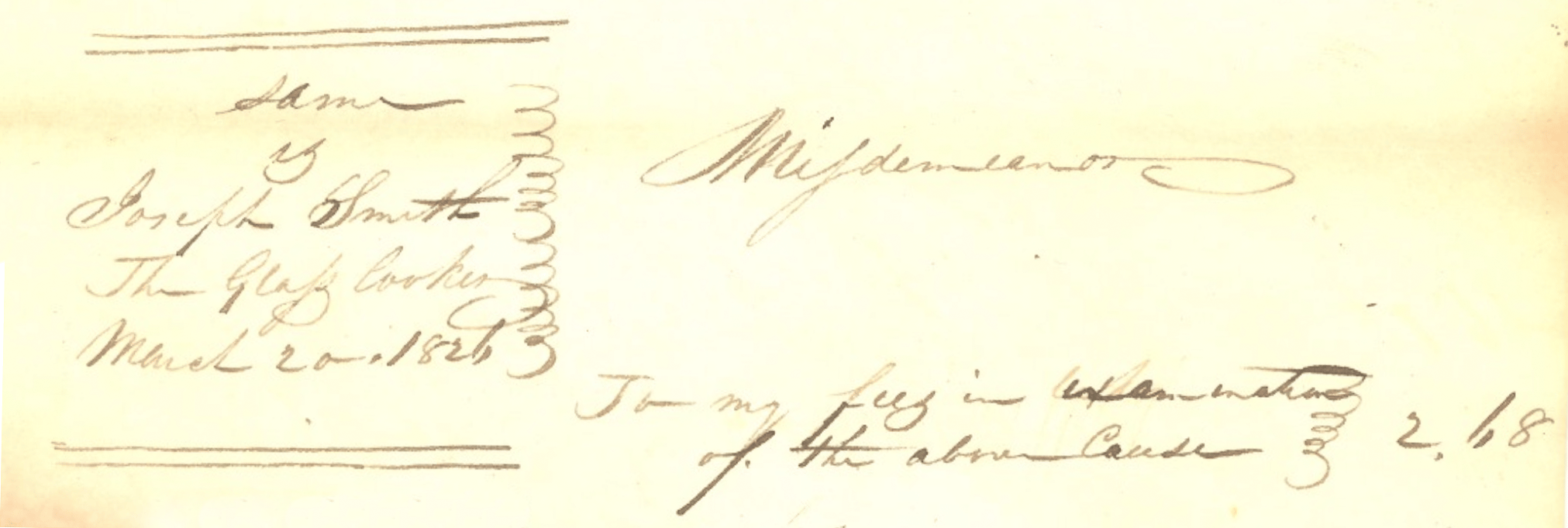Joseph Smith and Fraud Allegations

Was Joseph Smith convicted of fraud, money digging, or anything similar?
Possibly. Joseph Smith[BIO] appeared in court several times[1] for being a "glass looker" and a "disorderly person."[2] There are contradictory reports published about the results of an 1826 court appearance,[3] but incidents in 1829 and 1830 were dismissed.[4]

What were the allegations against Joseph related to fraud?
Events related to the 1826 and 1830 fraud-related judicial proceedings against Joseph Smith
November 1825
March 20, 1826
March 1829
Summer 1830
1834
July 1838
Joseph Smith addresses the charge of his having been a "money digger" in the Latter-day Saint periodical, Elders' Journal, saying that he was a money digger, but it was "never very profitable."[16]
1838–39
Joseph Smith composes his history, which mentions working for Josiah Stowell.[17]
June 27, 1844
29 years pass.
February 1873
May 1877
What is money digging or glass looking, and was it illegal?
"Money digging" involved looking for hidden treasure, while "glass looking" was the use of an object (e.g., a seer stone) to find lost treasure.[23] It was a common practice,[24] although it was often mocked as superstitious.[25] It would be considered illegal if one were suspected of defrauding another party,[26] which was the case with the allegations made against Joseph Smith in his March 1826 hearing.[27]
Related Question
Aren't seer stones weird magic things that prophets shouldn't be using?
Read more in Seer Stones
What did the legal term "fraud" mean at the time?
"Fraud" was defined at the time as "an attempt to gain or the obtaining of an advantage over another by imposition or immoral means, particularly deception in contracts."[28]
A judge examined people accused of fraud in order to collect information from those bringing charges against the accused.[29]
So, what happened in the 1826 case? Was he convicted?
Possibly. There are multiple contradictory accounts of the 1826 court appearance (see below).
Account Date | Reported Outcome | Source |
March 1831 | "condemned" but released | Abram W. Benton[BIO] writes in the Evangelical Magazine and Gospel Advocate that because Joseph was a youth at the time he was "designedly allowed to escape."[30][31] |
October 1835 | "honorably acquited" | Oliver Cowdery, in a letter to W. W. Phelps published in The Latter Day Saints' Messenger and Advocate, makes reference to "some very officious person" complaing of Joseph as being "a disorderly person," but Joseph was "honorably acquited."[32] |
March 1842 | "condemned" but released | Joel King Noble,[BIO] in a letter to Jonathan Turner,[BIO] says that "Civil authority brought up Jo. . . under the Vagrant act" and he "took Leg Bail. . .all things straight."[33] |
February 1873 | "Defendant guilty" | Charles Marshall[BIO] publishes a purported transcript of the court notes in Fraser's Magazine.[34] |
May 1877 | "prisoner was discharged" | William D. Purple, a critic of the Church who attended the hearing in 1826, writes about it many decades later in the Chenango Union newspaper.[35] |
What are the events surrounding the 1826 hearing?
In 1825, Josiah Stowell hired Joseph Smith to locate a silver mine.[36] After a few weeks, Joseph reportedly persuaded Stowell to give up the effort.[37] In 1826, some of Stowell's relatives felt that Joseph was exercising "unlimited control" over Josiah Stowell and brought Joseph to court, accusing him of "glass looking" and being a "disorderly person"[38] which resulted in the March 20, 1826 hearing.[39]
Do the court records for the 1826 hearing exist?
No. The original court record is no longer available, but the bills for the proceeding still exist.[40]
Is there good reason to believe one of the 1826 accounts over another?
Each of the accounts has merits as well as problems.[41] The only original documentation available indicates that there is no fee listed that would normally indicate a conviction.[42][43]
Another factor to consider is that critical affidavits from people who claimed to know Joseph at the time of the 1826 hearing make no mention of a conviction.[44] These affidavits were published in the 1834 anti-Mormon book Mormonism Unvailed.[45]
What did the witnesses say in the 1826 hearing?
A summary of what witnesses stated, based on the existing reports, during the 1826 hearing are as follows:
Witness | Summary |
Joseph Smith Jr. | Joseph Smith Jr. recalled how he found his stone.[46] In the Pearsall account, Joseph recalls how Josiah Stowell hired him, informing Stowell where to find treasures “in the bowels of the earth." In the same account, Joseph also states he gave up the practice as it hurt his eyes and he "had always rather declined anything having to do with this business."[47] |
Joseph Smith Sr.[BIO] | Joseph Smith Sr. spoke of his son's "wonderful triumphs as a seer" and that "both he and his son were mortified that this wonderful power which God had so miraculously given him should be used only in search of filthy lucre," hoping this power would eventually get used correctly.[48] |
Horace Stowell[BIO] | Horace Stowell described where a purported chest of dollars was buried in Winchester County, which Joseph purportedly marked the size of with leaves on the ground.[49] |
Arad Stowell[BIO] | Arad Stowell wanted Joseph Smith to display his skills. This resulted in Joseph reading a book he covered with a cloth while holding a white stone to a candle. This disappointed Arad who thought it was deception.[50] |
Jonathan Thompson[BIO] | Jonathan Thompson claimed Joseph stated there was a treasure protected by sacrifice. They struck the treasure with a shovel. One man placed his hand on the treasure, but it sank out of reach.[51] |
Mr. McMaster[BIO] | Mr. McMaster stated that he went with Arad Stowel to be convinced of Joseph's skills, but was initially convinced that Joseph was a fraud. He said Joseph pretended he could discern objects at a distance by holding a white stone to the sun or candle and Joseph "rather declined looking into a hat at his dark coloured stone."[52] |
Addison Austin[BIO] | According to the Benton account, Joseph Smith confessed to Addison Austin that he could not truly see any buried money, and knowingly engaged in such deception "to get a living."[53] |
Josiah Stowell | Josiah Stowell testified that Joseph "looked through stone and described [my] house and out houses, while at Palmyra at Sampson Stowell's correctly, that he had told about a painted tree with a man's hand painted upon it by means of said stone."[54] William Purple witnessed the testimony and recalled, “The testimony of Deacon Stowel could not be impeached. Prisoner was discharged.”[55] |
Was Joseph fined by the court in the 1826 hearing?
No, probably not. The bills from Judge Albert Neely[BIO] and Constable Philip M. De Zeng[BIO] do not indicate any fines, which were for court costs and were directed to the county for payment of witnesses and other costs.[56]
Did Joseph Smith ever say anything about the 1826 hearing?
No, not specifically. However, in the July 1838 issue of the Elders' Journal, Joseph admits that he was a "money digger" but "it was never a very profitable job to him, as [he] only got fourteen dollars a month for it."[57] Joseph also admitted that, as a youth, he was guilty of "many vices and follies.”[58]
What do we know about the 1829 hearing?
Not much. The only documentation about it is from a secondhand recollection by Lucy Mack Smith.[59]
What were the 1830 cases about?
In the summer of 1830, Joseph was charged in New York with being a "disorderly person" in two cases,[60] one in South Bainbridge[61] and one in Colesville.[62]
What is known about the 1830 South Bainbridge case?
The charges against Joseph before Justice Joseph Chamberlain[BIO] in South Bainbridge are not entirely clear. According to Joseph Knight Sr.,[BIO] Benton swore out the warrant for Joseph's "pretending to see under ground,"[63] and according to Joseph Smith, it was—at least to some degree—related to the earlier charges of his being a money digger as well as purportedly disturbing the peace when he "cast a devil" from Newel Knight.[64]
Joseph Knight hired James Davidson[BIO] to defend Joseph, but Davidson also advised Knight to hire John S. Reed.[65] The hearing continued until midnight when Chamberlain acquitted Joseph.[66]
What is known about the 1830 Colesville case?
The second case in 1830 was tried before a three Justice of the Peace court—a Court of Special Sessions in Colesville.[67] After the first hearing, Joseph received a warrant for the same crimes from a constable in Broome County for the second hearing.[68] According to John S. Reed,[BIO] witnesses were examined until 2 a.m., and the case was argued for another two hours until Joseph was acquitted.[69]
What did the witnesses say in the 1830 trials?
The following is a listing of the witnesses and a summary of what they said concerning the 1830 trials:
Joel K. Noble[BIO] | Joel K. Noble said the warrant issued against Joseph was for "breach of the peace against the state of New York, by looking through a certain stone to find treasure," adding that Joseph "was discharged; he had not looked in the glass for two years to find money, &c.,—hence it was outlawed."[70] |
Newel Knight[BIO] | Newel Knight testified to William Seymour[BIO] (prosecuting attorney) that Joseph did "cast a devil" from him "by the power of God."[71][72] |
John Reed[BIO] | Reed noted that after Joseph was found "not guilty" and discharged at the first trial, he was arrested again for a second trial in Colesville, where Joseph was also found "not guilty." The judges would reprimand Joseph "on account of his religious opinions."[73] |
Do the court records exist for the 1830 trials?
No, the court records for the 1830 trials have not been found.
Did Joseph Smith ever say anything about the 1830 trial?
Yes. In his history, Joseph recalled the 1830 trials, recalling that it was about "scandalous falsehoods" and that many witnesses "swore to palpable falsehoods" and that he was acquitted on both occasions.[74]



 about this topic
about this topic